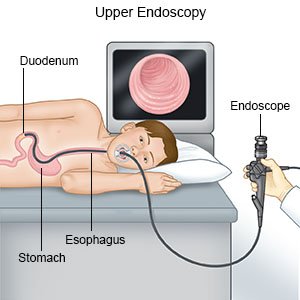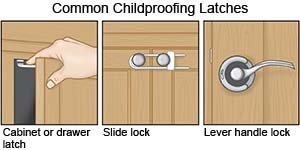Esophageal Foreign Body in Children
Medically reviewed by Drugs.com. Last updated on May 6, 2024.
What is an esophageal foreign body?
An esophageal foreign body is an object your child swallowed that got stuck in his or her esophagus (throat). Coins, button batteries, small toys, and screws are commonly swallowed objects. A piece of food or a fish bone can also become stuck in your child's esophagus.
What increases my child's risk for an esophageal foreign body?
The risk is highest among children 6 months to 3 years old. This is because babies and toddlers put objects in their mouths to learn about them. Your child's risk is also high if he or she has a mental or physical disability, has a gastrointestinal abnormality, or has had gastrointestinal surgery.
What are the signs and symptoms of an esophageal foreign body in children?
- Refusal to eat
- Drooling or vomiting
- Choking or gagging
- Coughing or noisy breathing
- Pain in his or her neck or throat
- Sore throat and a runny or stuffy nose
- Irritability and changes in behavior
- Fever
- Bloody vomit or rectal bleeding
How is an esophageal foreign body in children diagnosed?
Your child's healthcare provider will examine your child's throat, chest, and abdomen. Tell the provider your child's symptoms. If you saw your child swallow the object, tell your child's provider exactly what happened and when. The provider may use any of the following to find the object:
- A barium swallow or other x-rays may be used to check your child's neck, chest, and abdomen. He or she will drink thick liquid called barium while healthcare providers take x-rays. Barium helps your child's esophagus and stomach show up on x-rays.
- Laryngoscopy is used to examine the back of your child's throat. Your child's provider will use a light and a mirror. A scope may be inserted so the provider can see deep into your child's throat.
- A metal detector may be used to look for coins or other metal objects in your child's body.
- A CT may be used to check for objects in your child's esophagus or stomach. Your child may be given contrast liquid to help his or her esophagus and stomach show up better. Tell the healthcare provider if your child has ever had an allergic reaction to contrast liquid.
- Endoscopy may be used to see the inside of your child's digestive system. A scope is a long, bendable tube with a light on the end of it. A camera attached to the scope will take pictures. The object may be removed during the endoscopy.

How may an esophageal foreign body be removed?
Your child's healthcare provider may choose to observe your child for 24 hours or longer. Most objects pass through the digestive system on their own within 7 to 10 days. Objects that are small or smooth will often pass without a problem. You will need to search for the object every time your child has a bowel movement. Do not give your child laxatives or stool softeners. Do not force your child to vomit. Your child's provider may try to remove the object with any of the following:
- Forceps may be used to grab the object if your child's provider can see it in the back of your child's throat. Forceps also may be used to remove the object during endoscopy.
- Bougienage is a procedure used to push the object into your child's stomach. Your child's provider will insert a thin tube into your child's esophagus to widen it. This may be done if the object is smooth and likely to pass through your child's digestive system normally.
- A balloon catheter may be used to pull the object out of your child's esophagus. The catheter is a thin tube with a deflated balloon at the end. Your child's provider will insert the balloon catheter into your child's mouth or nose until it goes past the object. The balloon will then be inflated. This procedure may be done if the object is smooth or blunt.
- Surgery may be needed if the object cannot be removed another way.
How can an esophageal foreign body in children be prevented?
- Never leave any small item anywhere your child can reach it. Examples of small items include coins, earrings, small toys, batteries, and magnets. Keep nails and screws away from young children. Count them before and after you finish a project.
- Teach older children to keep small toys away from babies and toddlers. Marbles are especially easy for babies to swallow.
- Keep all medicines safely away from children. Keep medicines in childproof containers. Store medicines in a cabinet or similar place that can be secured with a childproof lock.

Call your local emergency number (911 in the US) if:
- Your child has chest or abdominal pain.
- Your child is choking.
When should I seek immediate care?
- Your child has a fever.
- Your child's vomit is bloody.
- Your child's bowel movement is black or bloody.
- Your child has trouble swallowing or breathing.
When should I call my child's doctor?
- The object has not come out within 3 days.
- You have questions or concerns about your child's condition or care.
Care Agreement
You have the right to help plan your child's care. Learn about your child's health condition and how it may be treated. Discuss treatment options with your child's healthcare providers to decide what care you want for your child. The above information is an educational aid only. It is not intended as medical advice for individual conditions or treatments. Talk to your doctor, nurse or pharmacist before following any medical regimen to see if it is safe and effective for you.© Copyright Merative 2024 Information is for End User's use only and may not be sold, redistributed or otherwise used for commercial purposes.
Learn more about Esophageal Foreign Body
Care guides
Further information
Always consult your healthcare provider to ensure the information displayed on this page applies to your personal circumstances.
